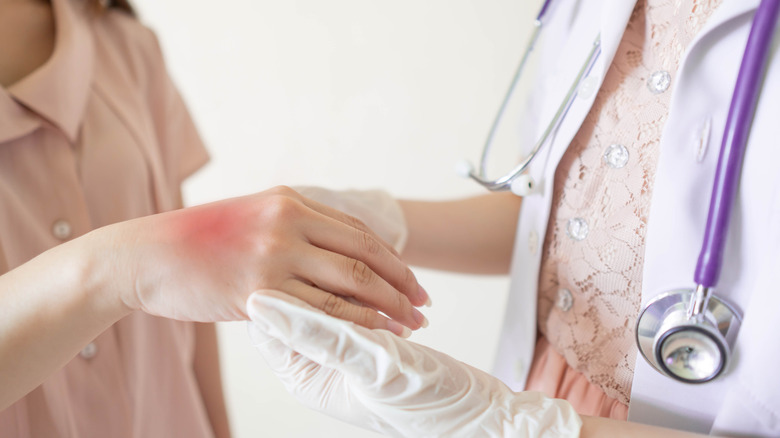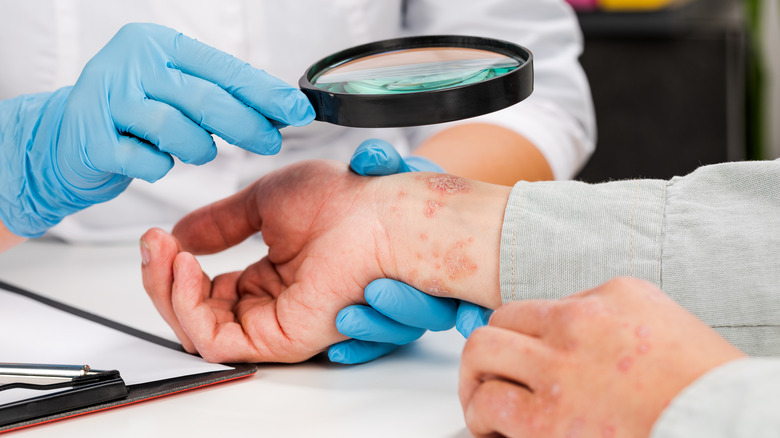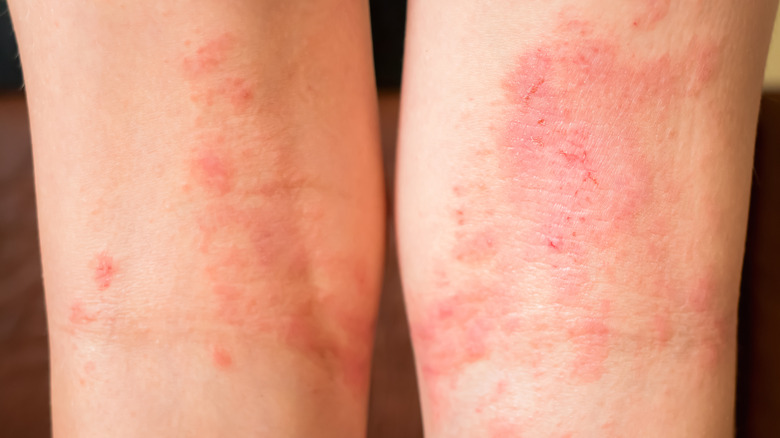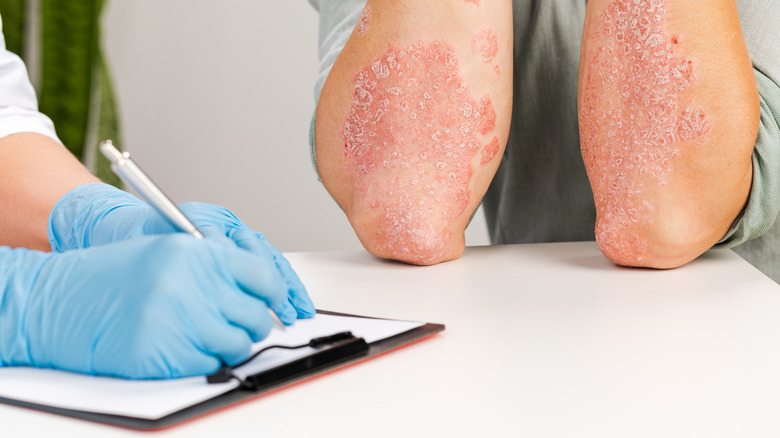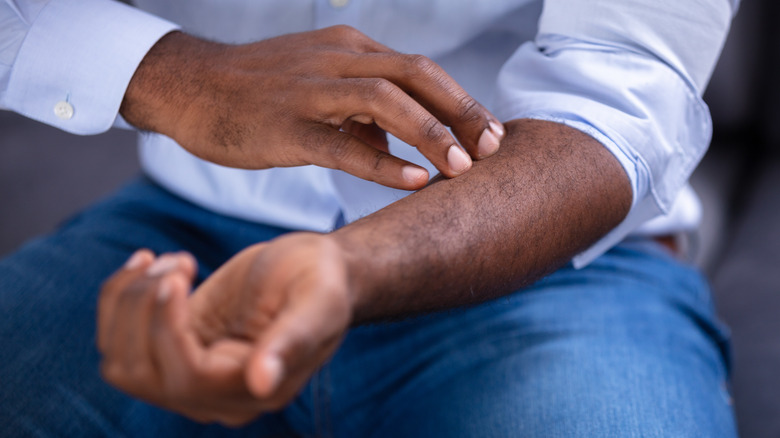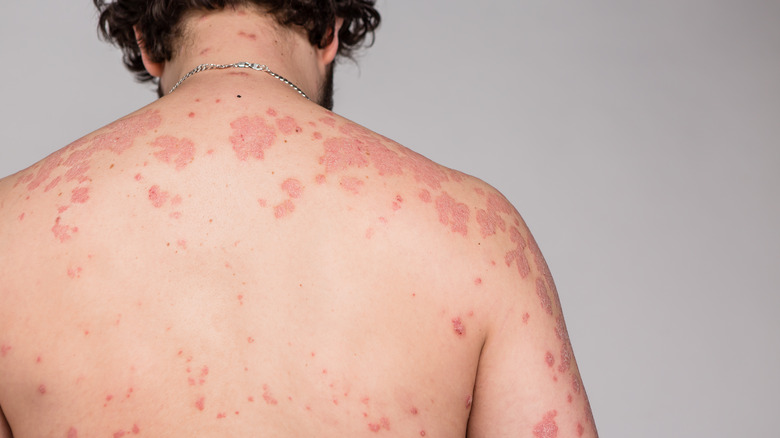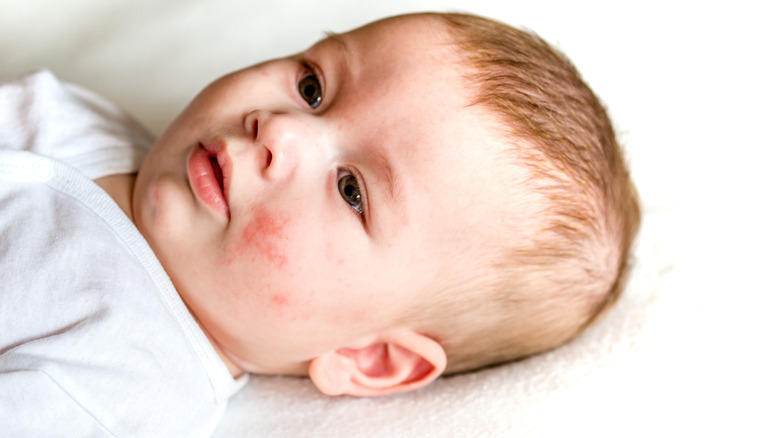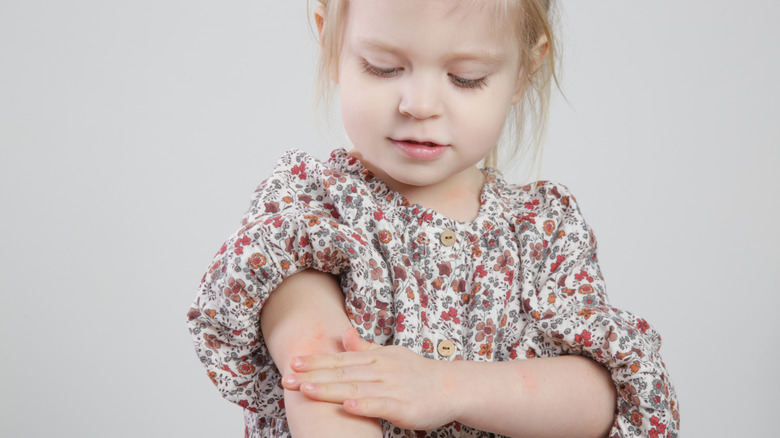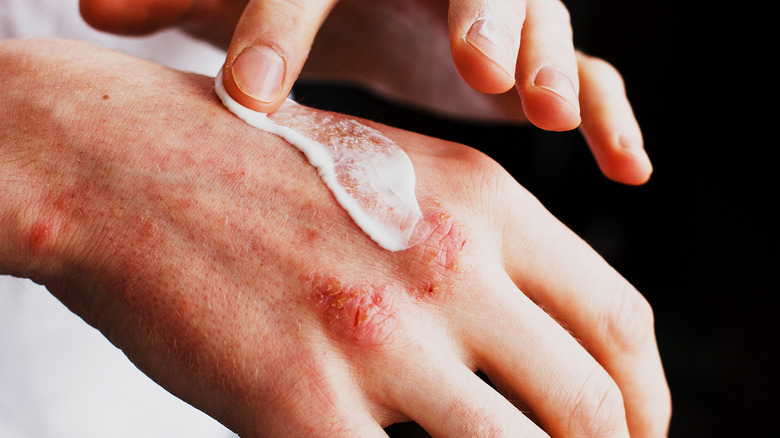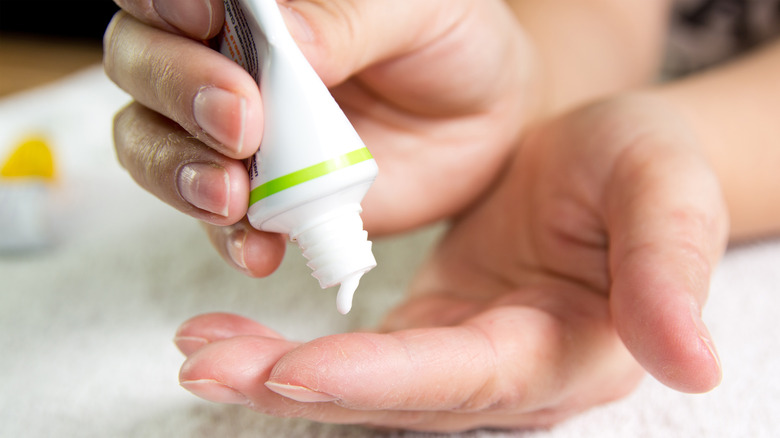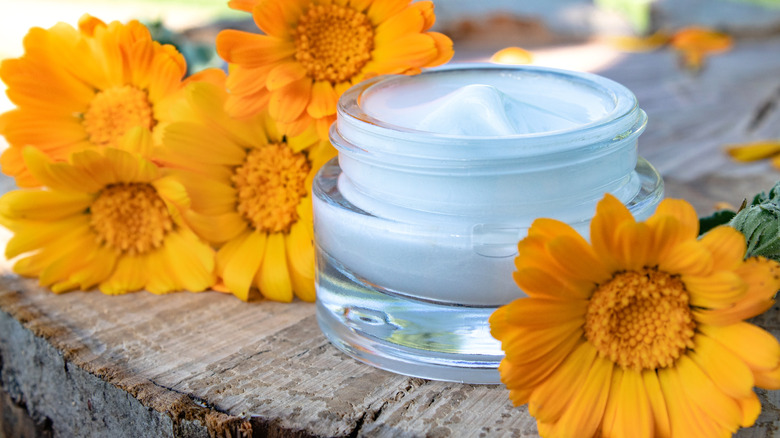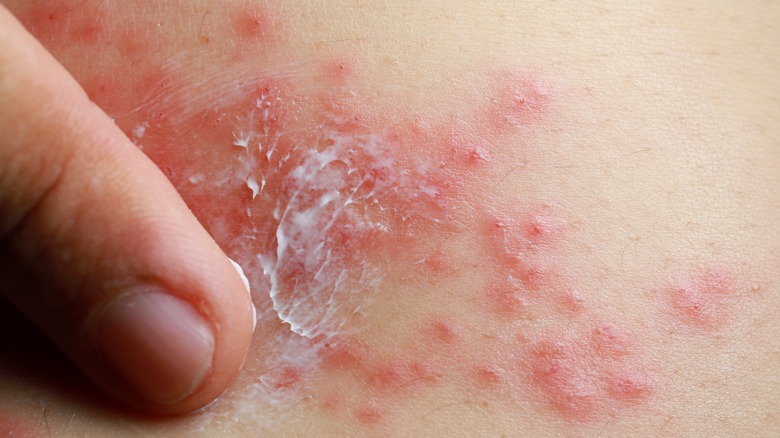Eczema Explained: Causes, Symptoms, And Treatments
Eczema, also called atopic dermatitis, is an umbrella term that encompasses a variety of skin conditions, according to the National Eczema Association. It's a very common condition that impacts over 31 million Americans. Eczema can develop at any time during a person's life. It's common in young children; however, some people don't have their first eczema flare until adolescence or adulthood.
There are several different kinds of eczema, and each individual with the condition can have different symptoms. The common symptom of all eczema is an itchy rash. This rash can appear almost anywhere on the body. For some, it's a minor annoyance. For others, the itch is so intense that they scratch their skin raw.
According to the Mayo Clinic, eczema is a chronic condition, which can be lifelong. Most people experience a cycle of flares and remission. During a flare, their eczema symptoms are moderate to severe. Once the flare is resolved, the eczema goes into a period of remission. Sometimes remission periods can last months or even years. Currently, there is no cure for eczema. Treatment focuses on managing and easing the symptoms of the condition and preventing future flares.
Symptoms of eczema
According to the Mayo Clinic, eczema can manifest as several different kinds of rashes. Most people develop patches of discolored, dry, itchy skin. The itch can range from mild to intense, and many people experience more itchiness at night. Eczema can show up as red, pink, purple, brown, or grayish patches of skin. Sometimes eczema causes the skin to thicken, crack, and appear leathery or scaly, per the National Eczema Association. It can also cause small raised bumps that are filled with fluid. If these bumps are scratched, they will leak the fluid and crust over like a scab. If the rash gets really bad, it can actually cause swelling. Eczema also makes the skin extremely sensitive, which means that it's more likely to react to irritants during an eczema flare.
Eczema most commonly appears on the hands, feet, wrists, ankles, chest, neck, eyelids, and on the inside of the elbows and the back of the knees (via Mayo Clinic). However, it can show up almost anywhere, and can show up in different locations on the body during each flare-up. That said, according to Healthline, some varieties of eczema are specific to certain locations on the body.
Different kinds of eczema
There are seven distinct kinds of eczema, per Healthline. The most common type of eczema is atopic dermatitis. The dry, red rash is the result of an immunological allergic response, and usually appears in childhood. It is often accompanied by other allergies like hay fever and asthma. In neurodermatitis, thick, scaly patches appear all over your skin. The rash is extremely itchy, and will bleed if scratched too much. This can cause infections. With dyshidrotic eczema, small blisters form on your hands, fingers, and the bottom of your feet. The blisters can be itchy or painful and may cause the surrounding skin to crack, become scaly, and flake off. And while most eczema appears as large, irregularly shaped patches of irritated skin, nummular eczema appears as perfectly round, scaly patches of skin. This type of eczema is extremely itchy.
Stasis dermatitis is a distinct type of eczema that happens when compromised veins leak fluid into your skin. This leakage causes swelling, a red rash, and itching. In addition to a rash, people with this form of eczema usually notice excessive swelling in their legs. And finally, contact dermatitis happens when your skin gets irritated by an allergen or chemical. The skin turns red and may burn or sting. You might get blisters or hives as well. Hand eczema, a rash that only appears on the hands, is often the result of contact dermatitis. It commonly occurs in people who work in professions where their hands are exposed to chemicals.
Diagnosing Eczema
According to WebMD, your primary care physician can usually diagnose you with eczema by taking a look at your rash and asking some questions about your lifestyle and medical history, like whether you have allergies. Your doctor will also ask questions about the rash: when it appears, whether it disappears at any time, and how long you've had it. Additionally, they'll ask if you've noticed any triggers that seem to cause the rash to flare. Your doctor may also refer you to a dermatologist or an allergist.
A dermatologist may take a small biopsy to gather more information about your rash, per the American Academy of Dermatology Association. This involves removing a tiny portion of the skin affected by the rash. That tissue is examined under a microscope, which can provide information about treatment options.
According to the American College of Allergy, Asthma, and Immunology (ACAAI), allergists will dig into the allergic responses that lead to your eczema. They do this by gathering detailed information about the things that come into contact with your skin on a daily basis like the clothes you wear, the soaps you use, and the chemicals you may be exposed to. They'll also ask about food allergies. Additionally, allergists may perform allergy testing. This is done by pricking the skin with a small needle covered in a diluted allergen. The allergist will observe your skin after the prick to see how it reacts. Gathering information about other allergies can provide vast insight into eczema treatment.
Identifying eczema on darker skin
Until relatively recently, the majority of medical literature on diagnosing and identifying eczema only showed what the condition looked like on light skin. One study that examined images of medical conditions in the widely used medical textbooks found that dark skin was only represented in about 4.5% of those images (via Social Science & Medicine). Because of this, eczema is often misdiagnosed or not diagnosed at all in people with darker skin.
In 2021, the ACAAI and the Allergy and Asthma Network partnered up to launch the site Eczema in Skin of Color to help medical professionals and individuals recognize the symptoms of eczema on darker skin. According to the site, eczema does not appear as the classic red rash on darker skin. Instead, the rash is often darker brown, purplish, or ashen gray. In dark skin, eczema can also cause hypopigmentation, causing some patches of skin to be much lighter than normal. Other classic eczema symptoms like thick, scaly, itchy patches on the skin, swelling, and sores also appear on darker skin, but are often not diagnosed as eczema because the rash looks different than it does on lighter skin tones.
Eczema can also cause small bumps on darker skin that resemble goosebumps, especially when they form near hair follicles. If these bumps are scratched too much, it can cause the skin to thicken. Larger bumps called prurigo nodules can also form.
Is it eczema or something else?
According to WebMD, several different conditions that cause rashes are often mistaken for eczema. Psoriasis is especially hard to differentiate from eczema because the conditions have very similar symptoms. Both cause dry, scaly patches of skin that are usually quite itchy. The primary way to tell the difference between psoriasis and eczema is that psoriasis usually causes a thicker rash than eczema. Another big difference between the two conditions is that psoriasis rashes never leak fluid, while eczema rashes sometimes do.
Hives can also look a lot like eczema, but these usually fade within a day, whereas eczema can stick around for weeks or even months. Hives can be accompanied by swelling of the throat, lips, or eyelids, which does not happen with eczema. Ringworm, a fungal infection of the skin, causes round patches to appear on the skin. These patches are extremely itchy and can be dry and flaky, like an eczema rash. Because of the shape, ringworm can be easily confused for nummular eczema. Pimples, nodules, or cysts, caused by acne can also resemble eczema rashes.
Allergic reactions can also cause rashes that look a lot like eczema. The best way to tell whether your rash is eczema or an allergic reaction is to check for symptoms that don't involve the skin. Allergies can also cause watery eyes, an itchy or runny nose, respiratory problems, and swelling on the face. Eczema only affects the skin.
Causes of eczema
Though doctors and researchers have a comprehensive understanding of the mechanisms that trigger eczema, they don't yet know the root cause of the condition (via the National Eczema Association). The Cleveland Clinic states that genetics, your immune system, your environment, and your stress levels all play a crucial role in causing eczema. However, it's not known how exactly these factors interact to produce the condition in certain individuals.
What is known is that eczema often occurs in people with overactive immune systems, which identify normal substances as allergens. When the immune system is triggered by an allergen, it responds by producing inflammation. That inflammation is the root cause of eczema rashes. Each individual with eczema will have different triggers, so it can be hard to keep track of what exactly causes an eczema flare-up.
Researchers also theorize that eczema is caused by gene mutations that lead to an underproduction of a specific skin protein. One review article published in the medical journal Allergology International laid out evidence for the theory that people whose bodies don't correctly produce filaggrin, a protein essential in protecting the skin from pathogens and allergens, are predisposed to developing eczema. The authors suggest that a lack of filaggrin makes skin more vulnerable to pathogens and allergens, triggering an immune system response. The research into this theory is ongoing.
Who typically gets eczema?
Since there is a genetic component to eczema, people who have a family history of eczema are more likely to develop the condition, according to MedlinePlus. A family history of other allergies like hay fever and asthma are also associated with eczema. People who already have hay fever, asthma, or other severe allergies are also at high risk for developing eczema, even though eczema itself is not a true allergic reaction. About 60% of people who have eczema also have hay fever, asthma, or both conditions. Though the connection between food allergies and eczema hasn't been completely explained yet, about 30% of people with eczema also have food allergies.
Eczema typically appears for the first time in infancy and lasts through childhood. Many children will outgrow eczema by the time they reach their teen years. However, some people have eczema through adulthood. Eczema can also develop in adulthood. According to the Cleveland Clinic, research has found that women and Black people are more likely to get eczema than people in other demographics, though the reasons for this aren't yet clear.
Lifestyle factors can also put you at higher risk for developing eczema, per Verywell Health. People who work with chemicals are more likely to develop eczema, as are people who don't wear protective gear like gloves when they clean, garden, or paint.
Common triggers for eczema flares
Eczema flares appear in response to a trigger, according to Medical News Today. Each person with eczema will have different triggers, and while some people have several triggers, others only have a few. Each person with eczema will have to go through a deductive process to identify their triggers. However, there are some substances and circumstances that trigger eczema in lots of people.
Coming into contact with an irritant is one of the most common triggers for an eczema flare-up. Common irritants include cleaning products, artificial fragrances, lemon juice, vinegar, and baking soda. Friction created by skin rubbing against other skin or against clothing can also trigger eczema flares. Avoiding irritants by wearing looser clothing, keeping skin dry and clean, and wearing gloves while using chemicals can reduce the risk of a flare.
Overexposing the skin to water, especially with soap, is another common trigger for eczema. People who wash their hands or bathe frequently are more prone to flares because too much washing strips the skin of its natural oils and protective layers. To avoid a flare, use moisturizer right after contact with water and wash or bathe in warm, not hot, water. Dry skin is also a common trigger for eczema flares. People with eczema tend to have naturally drier skin, which then leads to more eczema. Frequent use of moisturizers is the best way to avoid this trigger.
How do stress and chronic inflammation impact eczema?
Extensive research has been done on the connections between psychological stress, chronic inflammation, and eczema. According to an article published in the medical journal Frontiers in Human Neuroscience, stress disrupts the body's immune system responses by creating inflammation throughout the body. Additionally, stress that persists for a long period of time inhibits the body's ability to produce certain anti-inflammatory compounds that are supposed to control inflammation. So, if we're under stress for long enough, our bodies enter a state of chronic, systemic inflammation. Since eczema is an inflammatory condition, per the National Eczema Association (NEA), systemic inflammation worsens the condition.
Often, times of heightened stress can trigger an eczema flare-up even if no other triggers were encountered. One study into the connections between stress and eczema found that stress plays a major role in the development of eczema and subsequent flare-ups, and that in turn eczema flare-ups increase psychological stress and physical responses to stress, which exacerbates eczema symptoms (via Acta Dermato-Venereologica). This creates a perpetual stress cycle that causes more inflammation, leading to more eczema flare-ups.
Learning to manage stress is crucial to managing eczema. According to the NEA, recent research has shown that using stress management techniques has a major impact on eczema. The organization suggests using techniques like meditation, meditative movement like yoga or tai chi, journaling, listening to soothing sounds or music, and getting outside for reducing stress to manage eczema.
Eczema may be connected to your overall gut health
Several studies have explored the connections between gut health and eczema. Most of these studies have focused on the gut microbiomes of infants who develop eczema. One meta-analysis of 44 studies on infants with eczema found that they had significantly different gut microbiota than infants without eczema or other allergic diseases (via BMC Pediatrics).
Some of the studies included in the meta-analysis found that infants with eczema have less variety of good bacteria in their intestines than infants without eczema. In particular, the infants with eczema had low levels of Lactobacillus and Bifidobacterium, but high levels of Clostridium and Staphylococcus aureus. This suggests that an imbalance of the gut bacteria may be a key factor in the development of eczema. Studies have shown that both Lactobacillus and Bifidobacterium play a crucial role in the immune system. Though eczema is not technically an autoimmune disease, an overly sensitive immune system plays a major role in the disease.
Fewer studies have examined adults with eczema. However, one study found that adults with eczema had significant imbalances in their gut microbiomes, and another study found that changes in the gut microbiome improved eczema symptoms. A meta-analysis of studies on the use of probiotics to improve eczema symptoms found that balancing the gut microbiome with probiotics can reduce eczema symptoms. More research is needed, but the current research definitely suggests a link between gut health and eczema in both children and adults.
Treatment options for eczema
Treatment plans for eczema are aimed at reducing the symptoms of the condition during a flare-up and preventing future flare-ups. According to the Mayo Clinic, you may be able to treat and prevent mild eczema with home remedies like frequent moisturizing with lotions formulated for eczema, taking oatmeal baths, and using hypoallergenic soaps and cleaning supplies. If home remedies don't work for you, then there are some over-the-counter remedies you can try. Anti-itch creams or ointments may help. Taking an over-the-counter antihistamine medication might help as well.
When these treatment options don't work, it's time to check in with your doctor. Your doctor will most likely start by prescribing topical treatments for your eczema like ointments or creams. If those don't ease your eczema symptoms, they might prescribe what are called biologic treatments. These are pills that aim to manage eczema from the inside out. If your eczema is severe and doesn't respond to other treatments, your doctor may suggest a therapy called wet dressing, which involves wrapping the affected areas in wet towels soaked with corticosteroids. This is often done by a nurse at a medical facility.
Topical treatments for eczema
Topical treatments for eczema refers to creams, ointments, and lotions that are put on the skin to relieve the symptoms of eczema and clear up the rash caused by the condition (via the American Family Physician). According to WedMD, over-the-counter topical treatments are the first line of treatment for eczema. Hydrocortisone creams or ointments can be easily obtained at your local pharmacy or grocery store. A few common brand names to look for are Cortizone 10, Corticool Maximum Strength, Therasoft Anti-Itch & Dermatitis, Dermarest, and Cort-Eze (via GoodRx). Most pharmacies will also carry a store brand cream or ointment just called hydrocortisone cream.
Stronger topical treatments can be prescribed by your primary care physician, a dermatologist, or an allergist. According to the American Family Physician, there are over 30 different kinds of corticosteroid topical treatments that your doctor can prescribe. They'll most likely start with a low-strength corticosteroid topical and increase the strength slowly until your symptoms are managed and your rash clears. Calcineurin inhibitors are another kind of topical treatment your doctor may prescribe (via WebMD). These creams or ointments inhibit the immune system response that causes eczema. Studies have found that they are just as effective, and sometimes more effective, as corticosteroids. Finally, Eucrisa is a prescription topical treatment that targets inflammation rather than the immune system. It's non-steroidal, which makes it a better treatment option for those who are sensitive to steroids.
Biologic treatments for eczema
If you have moderate or severe eczema that isn't controlled by over-the-counter or prescription topical treatments, your doctor may suggest you try a biologic treatment. According to Verywell Health, biologics are prescription medications that introduce antibodies into your system. These antibodies inhibit the production of interleukins, proteins that play a crucial role in the body's inflammatory response. By blocking these immune system proteins, biologic treatments reduce the amount of inflammation in the body. This can help reduce eczema flare-ups and the severity of eczema symptoms.
Currently, the only FDA-approved biologic treatment for eczema is a medication called Dupixent. According to an article published in the medical journal Experimental Dermatology, two other biologic medications are currently being tested for eczema treatment. These medications both block interleukin production, just like Dupixent. However, they target different kinds of interleukins. Other biologic treatments in development target molecules involved in the inflammatory response instead of proteins. By inhibiting the production of these molecules, the biologics reduce inflammatory responses, reducing eczema flare ups.
Biologics are a great alternative to steroid treatments in severe cases of eczema, as long-term steroid treatment, either topical or oral, can have several negative side effects including elevated blood pressure and blood sugar, thinner skin, eye problems, and general fatigue (via Mayo Clinic).
Natural treatments for eczema
There are several plants and herbs that may provide some relief from eczema symptoms, per Healthline. Taking an oatmeal bath using colloidal oatmeal is a common recommendation for people with eczema. The finely ground oatmeal mixed with water helps soothe and soften the skin.
Coconut oil is a natural moisturizer that also has antibacterial properties. It helps relieve the dryness and itchiness associated with eczema, and its antibacterial properties help prevent infections that can occur when eczema rashes break the skin and leak fluid. Sunflower oil also helps moisturize and protect the skin. One study published in the medical journal Pediatric Dermatology found that sunflower oil strengthened the outer layer of the skin and helped it retain moisture. Evening primrose oil has long been used as a topical and oral solution for calming inflammation (via Healthline). When used topically, it helps soothe inflamed skin. When taken orally, it may help reduce systemic inflammation, which could reduce the severity of eczema flares. Studies about its effectiveness are inconclusive, however, some people swear by the treatment.
Witch hazel is a natural astringent that helps soothe irritated skin. There are few studies to support the use of witch hazel to ease eczema symptoms, but anecdotally many people find it helps. Calendula cream has also been used for hundreds of years as treatment for skin conditions. Like witch hazel, there are very few studies into the effectiveness of calendula cream for eczema, but it's a common natural remedy for the condition.
Managing the itch-scratch cycle
The most important aspect of living with eczema is learning to manage what's called the "itch-scratch cycle" (via Allergy and Asthma Network). Basically, your eczema itches, so you scratch it, which irritates the skin further, which makes it more itchy and on and on. To break the cycle, you need to find effective ways to reduce the itchiness and avoid scratching. The Allergy and Asthma Network and the National Eczema Society have some great tips. Keeping the skin well moisturized is essential. Develop a routine for applying lotion or creams several times per day. After bathing, pat the skin dry and make sure there isn't any lingering moisture. Then apply lotion or creams immediately.
Keeping your fingernails short and "scratching with care" can also help break the itch-scratch cycle. If your fingernails are short, they're less likely to damage the skin if you do scratch. If you can't help yourself and need to scratch, try rubbing the area with your fingertips instead of scratching with the nails.
For some people, cooling the area helps relieve the itch. Put a cold compress or an ice pack on the itchy skin or take a cool oatmeal bath. Ice has the added benefit of reducing inflammation.
How long can an eczema flare-up last?
It's hard to determine how long an eczema flare-up can last because, according to the National Eczema Association, there's no standardized definition of what it means to have an eczema flare-up. Though people with eczema and their providers use the term "flare-up" regularly to refer to a period of time when eczema symptoms are worse than normal, what one person or their provider considers a flare-up may not be considered a flare-up by someone else. So, it's up to each person with eczema and their provider to determine what level of symptom severity constitutes a flare-up.
Because of the lack of a standardized definition for a flare-up, it's also difficult to determine what a return to "normal" looks like for each patient. For some patients, the end of a flare-up means complete resolution of their eczema symptoms. For others, it may mean significant improvement with some lingering symptoms.
Because of all this subjectivity around flare-ups, there's not really a way to determine how long eczema flare-ups "typically" last. That being said, the National Eczema Association states that flare-ups can last anywhere from a few days to several weeks. The best way to shorten a flare-up is to have a detailed plan to prevent flares and another to treat flares as soon as they begin.
Living with eczema
Living with eczema can be tough and uncomfortable, both physically and emotionally. The Allergy and Asthma Network and the National Eczema Society also have some great tips about lifestyle changes that can help you live with eczema.
Being meticulous about the fabrics that come into contact with your skin is essential. Wash clothes, bedding, and towels frequently with hypoallergenic detergents. If you're extra sensitive to detergents, add an extra rinse cycle to remove residue. Avoid fabrics that can irritate the skin like wool. Wearing loose clothing can help as well. The friction created between the skin and the fabric of tight clothes can irritate the skin even further.
Make sure you drink enough water throughout the day. The skin uses the liquids we ingest to moisturize, so make sure you're always hydrated. Drink more than you think you need to, especially when it's hot outside. Regulating the temperature of your body and your environment is also important. Cold environments can lead to dry skin, while hot environments lead to sweat, which can irritate eczema rashes. Keep your house at a comfortable temperature and use a humidifier to ensure that the air isn't too dry. When your body gets too hot, take a break and cool down, especially during exercise, which causes sweat and friction on the skin.
Since stress is a major eczema trigger, finding ways to reduce your stress levels is an important part of living with the condition as well.

